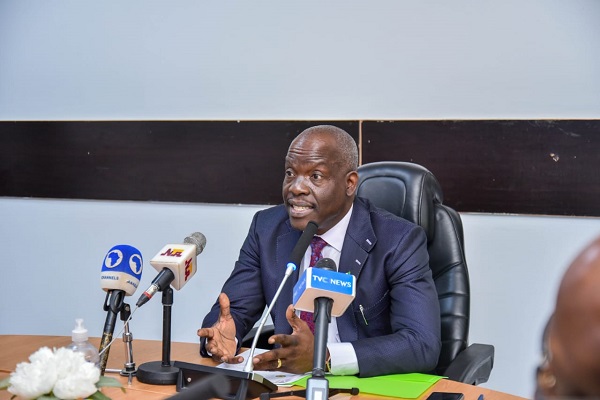
Nigeria may face gas supply crisis, says NUPRC
Gbenga Komolafe, an engineer and the Commission Chief Executive of the Nigerian Upstream Petroleum Regulatory Commission (NUPRC), issued a warning yesterday, stating that under the "Base Case Demand and Supply" scenario, the country could experience a shortage of 3.1 billion cubic feet per day (bcf/d) in gas supply by 2030.
This was revealed by Komolafe during his speech at the Association of Energy Correspondents of Nigeria's 2024 Annual Conference in Lagos yesterday (NAEC). The focus of the conference was "Navigating Nigeria's Trilemma of Finance, Energy Security, and International Politics: Gas as Energy Transition Fuel."
The CCE, represented at the event by Paul Osu, Regional Director, Lagos Office, stated that the demand for petrol was predicted to increase at a compound annual growth rate of 16.6% year between 2020 and 2030.
In addition, he revealed that in the "high case supply" scenario, natural gas production is expected to rise from 8.0 billion standard cubic feet per day in 2020 to 12.2 billion standard cubic feet per day in 2030. This increase is expected to be fuelled by significant projects like the Nigeria/Morocco pipeline, the Ajaokuta-Kaduna-Kano (AKK) Natural Gas Pipeline Project, and NLNG Trains 7 and 8.
Despite this estimate, Komolafe stated that it would not fulfil the "high case demand" scenario, which is estimated to be 22.2 bcfd in 2030, because the demand environment might drastically shift in just ten years, particularly if the issues facing the power industry are overcome.
"As the upstream industry regulator, the NUPRC is leading the charge to implement the interventions needed to realise the Decade of Gas. This includes promoting programs like the Nigerian Gas Flare Commercialisation Programme (NGFCP) for gas monetisation and flare elimination to promote energy sufficiency, eliminate waste, and address the pressing need to reduce carbon emissions. The NUPRC does this through the Petroleum Industry Act, 2021 (PIA).
Komolafe claims that the importance of this is that more gas would be available for domestic utilisation as Liquefied Petroleum Gas (LPG), feedstock for power generation plants, fertiliser plants and petrochemicals adding that each of these areas provides a unique entry point for willing investors.
He added that there was much politics involved in the global energy revolution and that it was not only about markets and technology. Nigeria's energy future is beset by three interconnected problems, or trilemas, as a member of the global community: international politics, energy security, and finance.
Nonetheless, Komolafe stated that in order to meet the most demanding global problems, the federal government and the Ministry of Petroleum Resources has started a revolutionary program.
He clarified, for example, how the Petroleum Industry Act (PIA), 2021 and the recent Presidential Executive Orders issued in March have worked in tandem to improve Nigeria's oil and gas sector's efficiency and boost its competitiveness internationally in order to generate higher rates of return on oil and gas investments. that despite the challenges posed by the climate calls, there was the confidence that investors would leverage sustainability mandates in the Petroleum Industry Act (2021) as well as the generous fiscal incentives.
Supporting Komolafe's arguments, Farouq Ahmed, the Chief Executive Officer of the Nigeria Midstream and Downstream Petroleum Regulatory Authority (NMDPRA), expressed regret that Nigeria continues to flare approximately 2.5 billion cubic feet of gas per day despite significant deficiencies in the country's gas utilisation. Ahmed was represented by George Ene Ita, the Director of Public Affairs.
He emphasised how urgently the nation must build a strong gas sector in order to meet its own energy needs as well as establish itself as a dependable energy provider for its neighbours, which will improve regional energy security and lessen reliance on foreign oil.
"We could have produced enough electricity to meet our energy demands with this wasted resource. The goal of the Decade of Gas project is to stop this waste, thus by 2030, has contributed significantly to our energy mix, adding up to 5,000Mega Watts (MW), to the national grid and reducing our reliance on imported fuels. As we invest in gas infrastructure, we must also ensure we diversify our energy sources and reduce dependency on any single fuel,” Farouk said, while assuring that the NMDPRA through the PIA and regulations, the Authority is creating a predictable framework for investors, ensuring fair pricing and encouraging competition.
In a similar vein, the nation is blessed with vast natural gas reserves, but it also finds itself at a crossroads of potential and problems, according to Gabriel Ogbechie, the conference chairman and group managing director of Rainoil Limited.
In his view, there is an increasing need to expand fuel alternatives in order to provide the country with clean, inexpensive energy solutions, energy security, and the development of a resilient energy system, especially in light of the recent termination of the petrol subsidy.
In order to build our gas infrastructure, he stated, "we need to continue attracting and providing investment, particularly in green financing; we need to strengthen the policy frameworks that support the scaling of CNG and LPG initiatives for both transportation and domestic use."





